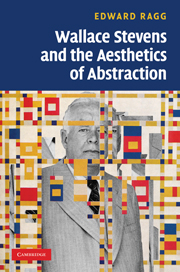Book contents
- Frontmatter
- Contents
- Acknowledgements
- List of Abbreviations
- Introduction: ‘Stevensian’ and the question of abstraction 1935–2009
- 1 The abstract impulse: from anecdote to ‘new romantic’ in Harmonium (1923) and Ideas of Order (1935)
- 2 The turn to abstraction: Owl's Clover (1936) and the ‘un-locatable’ speaker in The Man with the Blue Guitar (1937)
- 3 The ‘in-visible’ abstract: Stevens' idealism from Coleridge to Merleau-Ponty
- 4 Abstract figures: the curious case of the idealist ‘I’
- 5 Abstract appetites: food, wine and the idealist ‘I’
- 6 The pure good of theory: a new abstract emphasis
- 7 Bourgeois abstraction: poetry, painting and the idea of mastery in late Stevens
- Bibliography
- Index
- References
Introduction: ‘Stevensian’ and the question of abstraction 1935–2009
Published online by Cambridge University Press: 04 August 2010
- Frontmatter
- Contents
- Acknowledgements
- List of Abbreviations
- Introduction: ‘Stevensian’ and the question of abstraction 1935–2009
- 1 The abstract impulse: from anecdote to ‘new romantic’ in Harmonium (1923) and Ideas of Order (1935)
- 2 The turn to abstraction: Owl's Clover (1936) and the ‘un-locatable’ speaker in The Man with the Blue Guitar (1937)
- 3 The ‘in-visible’ abstract: Stevens' idealism from Coleridge to Merleau-Ponty
- 4 Abstract figures: the curious case of the idealist ‘I’
- 5 Abstract appetites: food, wine and the idealist ‘I’
- 6 The pure good of theory: a new abstract emphasis
- 7 Bourgeois abstraction: poetry, painting and the idea of mastery in late Stevens
- Bibliography
- Index
- References
Summary
The idea of life in the abstract is a curious one and deserves some reflection.
Abstraction (in poetry, not in painting) involves personal removal by the poet. For instance, the decision involved in the choice between ‘the nostalgia of the infinite’ and ‘the nostalgia for the infinite’ defines an attitude towards degree of abstraction. The nostalgia of the infinite representing the greater degree of abstraction, removal, and negative capability (as in Keats and Mallarmé). Personism, a movement which I recently founded and which nobody knows about, interests me a great deal, being so totally opposed to this kind of abstract removal that it is verging on a true abstraction for the first time, really, in the history of poetry. Personism is to Wallace Stevens what la poésie pure was to Béranger. Personism has nothing to do with philosophy, it's all art.
[R]ecently I have been fitted into too many philosophic frames. As a philosopher one is expected to achieve and express one's center. For my own part, I think that the philosophic permissible (to use an insurance term) is a great deal different today than it was a generation or two ago. Yet if I felt the obligation to pursue the philosophy of my poems, I should be writing philosophy, not poetry; and it is poetry that I want to write.
Information
- Type
- Chapter
- Information
- Wallace Stevens and the Aesthetics of Abstraction , pp. 1 - 29Publisher: Cambridge University PressPrint publication year: 2010
